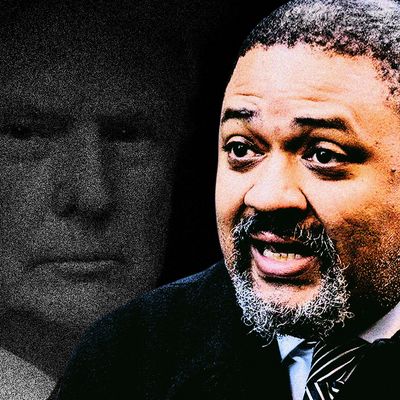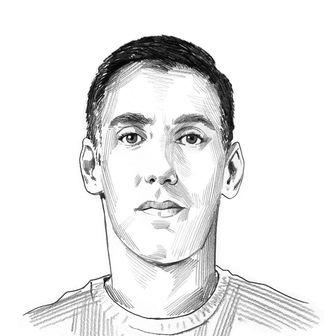
The Manhattan district attorney’s office’s criminal investigation into Donald Trump’s financial dealings has been thrown into disarray following the news Wednesday that the two prosecutors leading the investigation had abruptly resigned. A rough account already seems to have taken shape in the press — two well-respected lawyers in New York’s white-collar legal circles were stymied by a newly elected DA who has been distracted by a barrage of bad press since taking office — but there remain considerable reasons to maintain a healthy degree of caution about this version of events as we get our first glimpses behind the scenes of a very consequential mess.
The prosecutors who quit, Carey Dunne and Mark Pomerantz, were frustrated that after the previous DA, Cyrus Vance Jr., “authorized them to seek an indictment against the former president, the new district attorney appeared uninterested,” according to the Washington Post, which quoted a spokesperson who said the investigation is “ongoing.” (Some disclosures: I used to work at the same firm as Pomerantz but did not know him well; I interned for Bragg in law school and have maintained a cordial relationship with him since.)
A source familiar with the investigation provided an account to me that is broadly consistent with what has been reported elsewhere but sheds greater light on the breakup. Vance had repeatedly said last year that he was going to make final charging decisions before leaving office at the end of December, reiterating it to the Financial Times in late September. Around that time, Vance was disinclined to move forward against Trump, skeptical about the strength of the proposed case Dunne and Pomerantz had put together. By early December, though, Dunne and Pomerantz persuaded him there was a chargeable case. At that point, Vance authorized the two to move forward with their investigation with an eye toward indicting Trump after Bragg took over January 1, using the second of two grand juries that had been empaneled over the course of the investigation.
The charges that might have been brought against Trump were not entirely clear, according to the source, who says prosecutors were considering some combination of charges based on falsifying business records (which can either be a misdemeanor or the lowest-level felony offense in New York), conspiring to falsify Trump’s financial condition (in relation, perhaps, to lenders, tax authorities, or insurers), or committing criminal fraud such as grand larceny, which sounds dramatic but can also be charged at a variety of felony levels.
After Bragg took over, Dunne and Pomerantz briefed him on the investigation both in writing and in a series of meetings. The Post reported that Bragg “appeared not to be focused on the case,” taking his time to engage with the duo and their work, and the two prosecutors decided to stop presenting evidence to the grand jury once they realized a case against Trump was not a foregone conclusion. According to the source, things finally reached a breaking point when Bragg recently told the two that he did not think they had sufficient evidence to indict Trump — at least not yet — and that they should instead wait to see if they could develop or obtain additional evidence. Trump, for instance, might opt not to invoke his right against self-incrimination and could provide testimony to the New York State Attorney General’s Office in its civil probe that could be used against him in the DA’s criminal case. Another possibility was Trump Organization CFO Allen Weisselberg, who was indicted last summer for tax fraud along with the company, might decide to cooperate if he were ultimately convicted.
At that point, Dunne and Pomerantz concluded they were at an impasse. They believed they had a provable case against Trump — not a slam dunk, necessarily, but a case that was worthy of being brought right now, according to the source familiar with their thinking. Bragg disagreed, and Dunne and Pomerantz did not want to wait longer since there did not appear to be any dramatic breakthroughs on the horizon of the sort Bragg felt were necessary. Weisselberg, for instance, is currently scheduled to go on trial in late summer, but that could be pushed back.
It is worth taking a very big step back in order to consider a wider range of possibilities than the one many members of the media and legal commentariat appear to have been quick to adopt. Within hours of the first report of Dunne and Pomerantz’s departure, the editor-in-chief of Rolling Stone tweeted that a “source” had told him “Bragg appeared to back away from the politically-sensitive probe after the D.A.’s ‘day 1’ memo got so much blowback,” but the source’s claim makes little sense. If the knock on Bragg is that he is too soft on crime, then charging Trump would provide powerful evidence to the contrary; and indeed, anyone who had followed the DA’s race even cursorily last year knows Bragg campaigned on an increase in white-collar criminal enforcement. Some of the many legal pundits who became prominent during the Trump years — people whose entire public profile depends on the existence of Trump and his legal troubles — also quickly weighed in with dubious and occasionally offensive innuendo. On Wednesday evening, George Conway resurfaced an unrelated and unconfirmed allegation of misconduct against Bragg. Harry Litman, a former federal prosecutor and columnist for the Los Angeles Times who repeatedly and incorrectly assured people that a criminal fraud prosecution against Trump “would be easy,” referred to Dunne and Pomerantz as “top dogs” and urged his followers to “remember that Bragg has very little experience with and feel for state corruption cases,” a claim he later had to walk back in a “correction of sorts” because it is false.
Bragg has, after all, worked as a line prosecutor and as a supervisor on complex investigations both as a federal prosecutor and in the New York State Attorney General’s Office. There is no reason to doubt that his strictly professional judgment is just as reliable as that of Dunne or Pomerantz even if he happens not to fit the profile of the mostly white, well-to-do lawyers in the elite legal circles of New York and Washington, D.C., who seem to more easily attain the status of being “very seasoned and respected” (as Litman described Pomerantz), despite Bragg managing the considerable feat of becoming the first Black DA in Manhattan.
In fact, so far as we can tell based on the public record, there are some considerable reasons to doubt the strength of the case that Dunne and Pomerantz were able to build against Trump and that they may have presented to Bragg. This was always going to be a challenging case: Any complex financial fraud is hard to prosecute, particularly one that involves lawyers, accountants, or other advisers, all of whom can complicate the ability of investigators to establish that any particular person — much less the head of the relevant enterprise — intended to defraud third parties. The fact that the real-estate and hospitality industries appear to have more flexible and debatable methodologies of financial appraisal and valuation would make things harder.
Of course, Trump’s longtime accountants at Mazars recently disclaimed responsibility for a decade’s worth of Trump’s financial statements, but that development was not as clear-cut as many in the media sought to portray it. In any suspected financial fraud scheme involving records that went through an accountant or auditors, there are, very broadly speaking, two possibilities: The advisers were either lied to, or they were in on the scheme. Mazars clearly wanted to dissociate itself from that second possibility, but even so, the firm carefully noted that it had “not concluded that the various financial statements, as a whole, contain material discrepancies” — not exactly a ringing endorsement of a criminal fraud theory.
Then there is the question of key witnesses against Trump. Having evidently tried and failed to flip Weisselberg, Dunne and Pomerantz’s best potential cooperator against Trump appears to have been Michael Cohen, and the source familiar with the prosecutors’ thinking argued Cohen would have been a viable cooperator. But it would be extremely risky to use Cohen — a serial liar who did not fully cooperate with federal prosecutors in Manhattan and who has undercut his own value as a witness by spending much of the past two years railing against Trump in cable-news interviews and on his own podcast — as the key witness in a case against Trump without many other credible sources of independent corroboration.
How about other documentary evidence? Trump, of course, famously does not use email and loves destroying hard copies of documents. This would not foreclose the possibility of a criminal case based in large part on paper since prosecutors could try to establish Trump’s knowledge of misrepresentations in his various financial submissions by establishing that he had been apprised of the truth at around the same time as misrepresentations were delivered to third parties he signed off on, but this is one more very real evidentiary challenge in any prosecution of Trump.
If this was roughly the state of the investigation, it is not hard to see how reasonable and experienced prosecutors might come to different conclusions about the merits of pushing forward. By themselves, any one of the issues noted above would be significant but potentially manageable; all of them together would make for a serious uphill battle. In any long-term investigation, the sunk-cost fallacy — the tendency to push forward after a significant investment of time and resources even when it makes little sense — is a major problem, and that is one reason it can be helpful for someone who is clear-eyed and who has less of a mental and emotional stake in the proceedings to make an independent judgment about the strength of the evidence and the merits of moving full speed ahead.
In this case, it appears that person may have ended up being Bragg himself — the man who would ultimately bear the risk and responsibility of an unprecedented criminal prosecution against a former president.






























